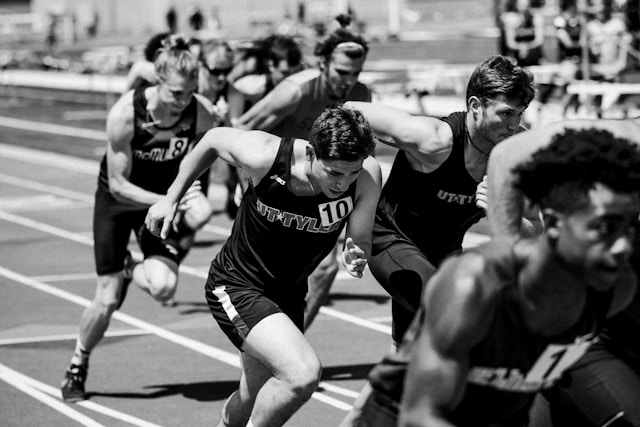
Sports: A Pathway to Personal and Community Wellness
Improving Physical Health
One of the most immediate benefits of participating in sports is the improvement in physical health. Regular physical activity keeps the body in shape, strengthens the cardiovascular system, builds muscle, and improves overall endurance. Sports like running, swimming, or cycling provide an excellent cardio workout, which helps maintain heart health and reduce the risk of heart disease and high blood pressure.
Moreover, sports help individuals maintain a healthy weight by burning calories and increasing metabolism. For those looking to build strength, sports like weightlifting, basketball, or gymnastics enhance muscle mass and boost bone density. Regular participation in sports also increases flexibility, agility, and balance, all of which are crucial for reducing the risk of injuries in daily life.
In the long term, the health benefits of sports extend beyond just staying fit. Regular physical activity through sports helps prevent lifestyle diseases like type 2 diabetes, certain cancers, and obesity. It also promotes better sleep, improves digestion, and contributes to a stronger immune system, making sports a comprehensive solution for long-term health.
Boosting Mental Health and Emotional Well-Being
While the physical benefits of sports are well-known, the mental health advantages are equally important. Participating in sports helps reduce stress, anxiety, and symptoms of depression. The release of endorphins, also known as “feel-good” hormones, during physical activity improves mood and provides a natural way to relieve stress.
Sports also encourage mental resilience and focus. Competitive sports, in particular, require athletes to stay disciplined, manage their emotions, and make quick decisions under pressure. These challenges promote emotional control and enhance cognitive function, improving mental clarity and problem-solving abilities.
In addition, the sense of accomplishment that comes from participating in sports, whether winning a game or achieving personal fitness goals, boosts self-esteem. This confidence extends to other areas of life, allowing individuals to feel more capable in managing challenges and pursuing success in work, education, and personal relationships.
Fostering Social Interaction and Teamwork
Sports have the unique ability to bring people together, creating opportunities for social interaction and teamwork. Whether it’s joining a local soccer team, participating in a group fitness class, or playing doubles tennis, sports encourage communication and cooperation. For those involved in team sports, the experience of working towards a common goal fosters a sense of belonging and camaraderie.
The social aspect of sports goes beyond just teammates. Spectators, fans, and volunteers also play an integral part in the sports community. Attending a local game, participating in sporting events, or supporting a favorite team are all ways for individuals to connect with others and build a sense of community. These interactions promote social bonding and create positive experiences that extend beyond the playing field.
Moreover, sports offer an inclusive environment where people from different backgrounds, cultures, and abilities can come together. This inclusivity helps break down social barriers and fosters mutual respect and understanding. By engaging in sports, individuals not only improve their social skills but also become more open-minded and empathetic, contributing to a more cohesive and supportive community.
Building Life Skills
One of the greatest benefits of sports is the development of essential life skills. Discipline, perseverance, and goal-setting are all qualities nurtured through sports participation. Athletes must dedicate time to practice, refine their techniques, and push through challenges to achieve success. These experiences teach the importance of hard work and persistence, values that are invaluable in all areas of life.
According to Atlas98 time management is another critical skill gained from participating in sports. Balancing training schedules, school or work responsibilities, and personal life requires effective planning and prioritization. This ability to manage time efficiently is beneficial in both personal and professional settings.
Additionally, sports teach individuals how to handle both success and failure. Winning a game is a rewarding experience, but the lessons learned from losing are just as valuable. Sports teach humility in victory and resilience in defeat, encouraging individuals to learn from their mistakes and continuously improve. These skills are vital for navigating the ups and downs of life with grace and determination.
Encouraging Community Engagement
Sports have the power to unite communities. Local sporting events, charity runs, and community leagues bring people together for a common purpose. These events create opportunities for individuals to contribute to their community, whether through volunteering, organizing, or simply participating.
In many communities, sports facilities serve as social hubs, providing a safe and supportive environment for people to engage in physical activity. Community sports programs also play a significant role in youth development, offering young people a constructive outlet for their energy and helping them build confidence, leadership skills, and a sense of responsibility.
In areas where sports are a central part of community life, they can reduce social isolation and promote a sense of pride and identity. Whether it’s a local high school football game or a regional marathon, these events give people something to rally around, fostering a sense of unity and collective achievement.
Conclusion
Sports are more than just games—they are a vital aspect of a healthy, balanced, and fulfilling life. From improving physical and mental health to fostering social connections and community engagement, sports offer countless benefits for individuals of all ages. Whether played competitively or recreationally, the impact of sports on personal and community well-being is profound. So, lace up your shoes, grab a ball, or join a local team—sports have the power to change your life for the better.